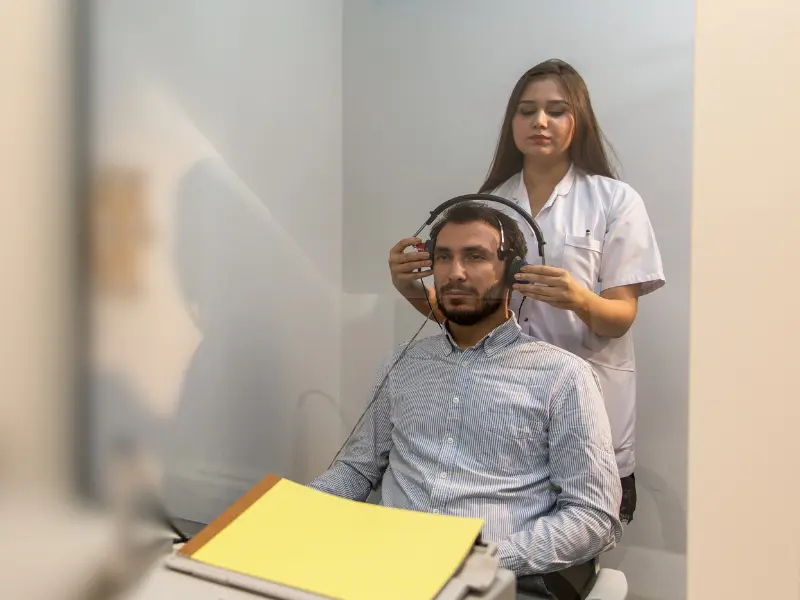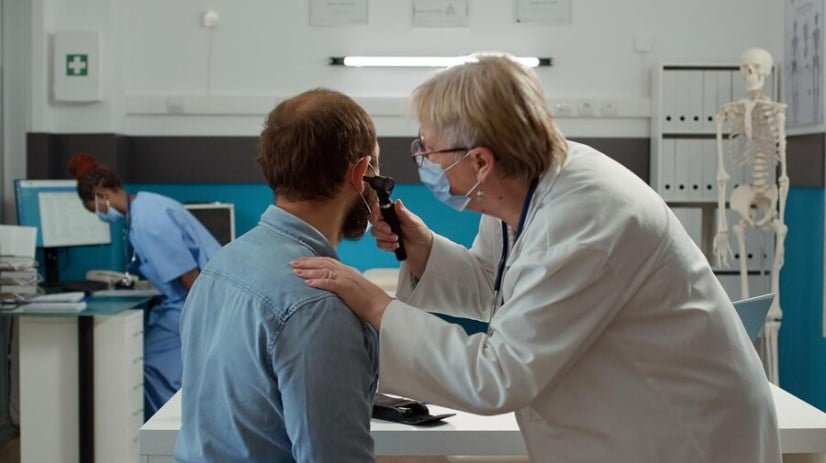HEARING LOSS TREATMENTS OPTIONS
HEARING LOSS TREATMENTS OPTIONS

HEARING LOSS TREATMENTS OPTIONS

Advanced Hearing Loss Treatment
We now have more advanced hearing loss treatment options than ever. At Hearing Expert, our certified experts are dedicated to finding the best solution for your specific needs.
If you have hearing loss, we provide the latest in hearing technology to improve your hearing. It all begins with a comprehensive hearing assessment.

Advanced Hearing Loss Treatment
We now have more advanced hearing loss treatment options than ever. At Hearing Expert, our certified experts are dedicated to finding the best solution for your specific needs.
If you have hearing loss, we provide the latest in hearing technology to improve your hearing. It all begins with a comprehensive hearing assessment.
Types of Treatments for Hearing Loss
After a thorough evaluation, a hearing expert will discuss your treatment options, which may include:
- Hearing aids
- Earwax removal
- Medications
- Cochlear implants
- Bone-anchored hearing systems
If hearing aids are recommended, your expert will guide you through the best options for your needs.


Types of Treatments for Hearing Loss
After a thorough evaluation, a hearing expert will discuss your treatment options, which may include:
- Hearing aids
- Earwax removal
- Medications
- Cochlear implants
- Bone-anchored hearing systems
If hearing aids are recommended, your expert will guide you through the best options for your needs.
Hearing loss is either sensorineural or conductive, each with specific treatment options.
Sensorineural hearing loss is the most prevalent type, typically resulting from aging or exposure to loud noises.
The primary treatment for sensorineural hearing loss is hearing aids. With various types available, we at Hearing Expert will assist you in finding the ones that best match your specific hearing needs, preferences, and lifestyle.
Conductive hearing loss is less common than sensorineural loss and is caused by obstructions or damage to the middle or outer ear, preventing sound from being properly processed.
This type of hearing loss can be temporary if the obstruction is removable. In cases of earwax buildup, ear infections, or foreign objects, medical treatments such as removal of the obstruction or antibiotics may resolve the issue.
For more complex cases, such as ear drum injuries or tumors in the middle ear, treatment typically involves hearing aids or bone-anchored hearing systems, which are surgically implanted devices that transmit sound through bone conduction.
Allergy-related mucus buildup can cause fluid or wax accumulation in the ears, obstructing soundwaves. Additionally, allergic skin reactions may lead to swelling, which can impact your hearing.
Fortunately, seasonal allergies and allergic skin reactions are usually temporary. Consult your doctor about medications to relieve your allergy symptoms, as improving these symptoms may also enhance your hearing.
Noise-induced hearing loss can result from a single exposure to a loud sound or prolonged exposure to loud noises over time.
Such exposure can damage the hair cells in your ear, leading to sensorineural hearing loss. Hearing aids are the most effective treatment for this type of hearing loss. Always protect your hearing when exposed to loud sounds, music, or noise.
Tinnitus is often described as a buzzing or ringing in the ears, though it can manifest as other sounds as well. These sounds are not from external sources. About 80% of people with tinnitus also experience some level of hearing loss.
While there is no cure for tinnitus, its impact can be managed. Since most people with tinnitus also have hearing loss, hearing aids are frequently recommended. Hearing aids can help in two ways: they amplify external sounds, making tinnitus less noticeable, and they can include sound therapy programs to provide soothing sounds directly through the hearing aids.
Sudden hearing loss, or sudden deafness, is an unexplained loss of hearing that occurs either suddenly or over a few days, typically affecting one ear.
Seek Immediate Help
If you suspect you’re experiencing sudden hearing loss, contact your GP right away, as it is considered a medical emergency. While some cases resolve on their own, others may be treated with medical intervention.
The exact cause of sudden hearing loss is not well understood, but it may involve conductive hearing loss or an obstruction, so doctors will often check for treatable obstructions.
Steroids are commonly used to reduce inflammation and swelling in cases of sudden deafness. If initial treatments are not effective, hearing aids may be recommended. In some cases, hearing care experts might suggest cochlear implants or bone-anchored hearing systems, which are surgically implanted devices.

Explore Hearing Aid Styles for All Levels of Hearing Loss
Understanding your degree of hearing loss is crucial in finding the right hearing aid for you. Regardless of your hearing loss level, your hearing care expert will review the available options to match your specific needs.

Explore Hearing Aid Styles for All Levels of Hearing Loss
Understanding your degree of hearing loss is crucial in finding the right hearing aid for you. Regardless of your hearing loss level, your hearing care expert will review the available options to match your specific needs.
Mild to Moderate Hearing Loss
For mild to moderate hearing loss, you have many hearing aid styles to choose from. Both in-the-ear and behind-the-ear options are suitable, with features that can be customized to your preferences. Your hearing expert will help you find the best fit.


Mild to Moderate Hearing Loss
For mild to moderate hearing loss, you have many hearing aid styles to choose from. Both in-the-ear and behind-the-ear options are suitable, with features that can be customized to your preferences. Your hearing expert will help you find the best fit.

Severe Hearing Loss
For severe hearing loss, behind-the-ear hearing aids are often the most effective choice due to their power and technology. Full shell in-the-ear hearing aids might also be suitable, depending on your specific needs. Your hearing expert will ensure that the features of the hearing aid are tailored to your individual requirements.

Severe Hearing Loss
For severe hearing loss, behind-the-ear hearing aids are often the most effective choice due to their power and technology. Full shell in-the-ear hearing aids might also be suitable, depending on your specific needs. Your hearing expert will ensure that the features of the hearing aid are tailored to your individual requirements.
Profound Hearing Loss
For individuals with profound hearing loss, if a powerful behind-the-ear hearing aid does not sufficiently improve everyday hearing, your hearing care expert may suggest surgical options like cochlear implants or bone-anchored hearing systems.


Profound Hearing Loss
For individuals with profound hearing loss, if a powerful behind-the-ear hearing aid does not sufficiently improve everyday hearing, your hearing care expert may suggest surgical options like cochlear implants or bone-anchored hearing systems.
Did you know?
FAQS ABOUT TREATING HEARING LOSS
As soon as you notice signs of hearing loss, it’s important to seek treatment. Doing so will not only benefit your long-term health but also help you quickly adjust to the improved quality of life that comes with better hearing. Your hearing expert can guide you through the process.
Over time, the lack of auditory stimulation from hearing loss can lead to social isolation and raise the risk of depression and even dementia. Getting treatment for hearing loss early on can greatly benefit your long-term health and well-being. Your hearing expert can assist in finding the right solution.
While modern hearing aids greatly improve hearing, they don’t restore it to 100%. However, they can come close, helping you hear, process, and understand sounds clearly. The benefits of hearing aids, especially in enhancing quality of life, self-confidence, and social interaction, make them invaluable.
Advanced hearing aids from Oticon, like the Oticon More, work with your brain to provide a natural hearing experience. The Oticon More is the first hearing aid proven to support the brain’s natural ability to organise and process sounds.
Hearing loss cannot be naturally treated. Age-related and noise-induced hearing loss are permanent, while conductive hearing loss often requires medical treatment.
However, some people find that tinnitus, which is commonly linked to hearing loss, can be somewhat alleviated through relaxation techniques like yoga.





